#classical chinese poetry
Text
the chinese "i love you"
So it feels like people never say "I love you" in chinese. 我爱你.
Since old poetry in the Warring States era and such, people have been using more metaphorical or discreet ways to express affection, for instance "I'm thinking of you" or "I miss you" (eg. the character 思 sī), instead of "love". They consider these less literal means more literary and beautiful.
The two classical poems that immediately come to mind would be these:
山有木兮木有枝,心悦君兮君不知。——〈越人歌〉
rough translation: the hills have trees and the trees have branches; I love you but you do not know.
and the other:
彼采葛兮,一日不见,如三月兮。——〈王风·采葛〉
rough translation: the girl picking the arrowroot, I haven't seen her for one day, and it feels I haven't met her for three months.
The poem then progresses to two more stanzas of the similar structure, from three months to three seasons (nine months) and to three years.
"Love" may be used as a more abstract idea, or in philosphical contexts, say confucianism and mohism, to mean compassion and charity, loving everyone, loving regardless something something, etc.
But in all honesty people are just more timid. And culturally speaking, I might put 喜欢 (xǐ huān) on a spectrum between "love" and "like", it already carries that meaning of love, if just not as heavy.
As such, in novels set in older eras they may prefer terms like "心悅/傾慕" (xīn yuè / qīng mù) to mean I like you, and in modern ones they like using 喜欢, also meaning "like", as shyer ways of expressing love.
And so it's usually in the traumatic breakdowns and emotionally charging scenes in the depths of the night that they actually use the phrase "I love you".
#danmei#cdrama#chinese language#language#classical chinese poetry#love language#chinese#literary chinese#cnovel#fate's meta
78 notes
·
View notes
Text
A Compilation of Chinese Period drama OSTs that are inspired by Classical Poetry- Part 3
Part 1, Part 2
.
More in Confirmed List
8. The Long River
"Life Passes Like a Dream (浮生若梦)" (Ending theme) by Li Bai, performed by Wang Zhenhua
youtube
.
9. Oh My General (2017)
Yang Lin [杨蔺] - Pride of the Fishermen [渔家傲] by Fan Zhongyan
I couldn't find a way to share an mp3, but you can find it here and listen from there.
.
10. Dream of the Red Chambers (1987)

Source

Source
Sadly I couldn't find any other songs he composed based on the original poems for the drama, except the one below. If you know more, please do share! 🥺 🙏
Burial of Flowers
youtube
A famous cover by Tong Liya
I highly recommend listening to this chilling cover done for the kiddie drama version of Red Chambers as well.
.
11. Romance of the Three Kingdoms (1994)
滚滚长江东逝水 Gǔngǔn Chángjiāng Dōngshì Shuǐ (The Billowing Yangtze River Flows East) by Ming Dynasty poet Yang Shen, performed by Yang Hongji
.
短歌行 Duǎngē Xíng (A Short Song) by Cao Cao; performed by Yang Hongji
Extra: Rendition of the same scene in Three Kingdoms (2010) with Eng translation and in Advisors Alliance (2017)
youtube
.
子夜四时歌 Zǐyè Sìshí Gē (The Midnight Song) Lyrics adapted from a Southern Dynasties era poem; performed in a Wu accent. Played during Liu Bei and Sun Shangxiang's wedding scene in episode 43. Source
A translated fanvid
youtube
.
七步诗 Qībù Shī (The Seven Steps Poem) by Cao Zhi; performed by Liu Huan
(Aka the Bean Poem. Here's a nice comparison of the same scene in different dramas by another Tumblr user!)
youtube
.
丈夫歌 Zhàngfū Gē (A Song for Men) by Luo Guanzhong; performed by Lü Jianhong
youtube
.
There are more but this is all I was able to find :(
.
12. The Advisors Alliance (2017)
In the same spirit (their version of Duan Ge Xing is already shared above),
十五从军征 At Fifteen I Joined the Army on Expedition by unknown Han dynasty poet, performed by Jin Yushan (金语衫) (not sure, Wikipedia says Jin Yubin) Here's a cartoon version as well.
The thumbnail of the vid is incorrect for some reason btw. It's from AA not 3K.
youtube
.
怨歌行Yuan Ge Xing (Song of Regret) by Ban Jieyu, performed by Yeung Tung & Lu Moyi
.
13. My Fair Princess (1998)
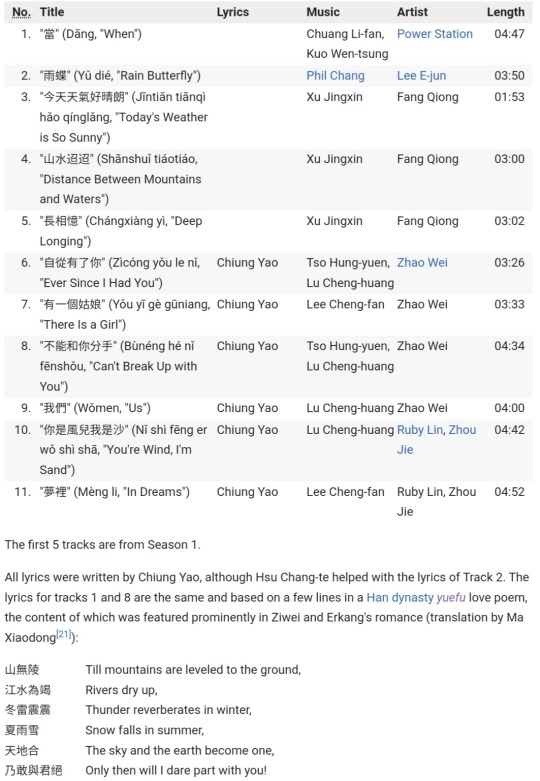
youtube
.
14. Shaolin Wendao (2016)
Not a poem, but the ost is made out of the Mahayana Buddhist Sutra Da Bei Zhou/Great Compassion Mantra/Nilakantha Dharani.
This was one of the first songs I have listened on YouTube, even before I started watching Cdramas etc. It has always brought me great sense of calm and peace. Only recently, more than like 5 years later I finally found out where it is from.
Da Bei Zhou (大悲咒) by Jing Shan Yuan (敬善媛)
The scene from drama
Full ost:
youtube
.
15. Journey to the West (2011)
Similarly, the opening ost was taken from the mantra of the Mahayana Buddhist scripture Heart Sutra.
Xin Jing (心经) performed by Yang Xiaolin
youtube
.
My other posts
#Youtube#My goodness I am so tired#classical Chinese poetry#drama osts#Cdrama#Chinese drama#gufeng#guofeng#The Long River#romance of the three kingdoms#oh my general#dream of the red chamber#my fair princess#shaolin wendao#journey to the west#three kingdoms#the advisors alliance#poetry
78 notes
·
View notes
Quote
Spring days bring the sun's warmth and orioles full of song, of restless song, as girls take their fine baskets and go wandering on subtle paths in search of tender mulberry leaves.
‘Seventh Moon’ from The Book of Songs (c.15th to 6th century B.C.E.), Classical Chinese Poetry: An Anthology translated by David Hinton
#chinese poetry#classical chinese poetry#the book of songs#spring#quotes#in the soft earthen breeze#bee pollen and honeycomb#it's age old and I love it#*
37 notes
·
View notes
Text
track length: 2m55
(also on the Internet Archive - mp3, 2.0 MB)
李清照 Li Qingzhao
行香子·七夕 Qixi Festival
original translation on tumblr
transcript:
This is 行香子·七夕
"Qixi Festival" (to the tune 'Offering Incense')
by Li Qingzhao.
草际鸣蛩。
惊落梧桐。
正人间、天上愁浓。
crying crickets by the field's edge
shake loose the wutong leaves
sorrow lies heavy upon both earth and heaven
云阶月地,
关锁千重。
纵浮槎来,
浮槎去,
不相逢。
cloud stairs between the moon and earth
a thousand locks bar the way
one raft drifts on the sea
one on the heavenly river
never meeting
星桥鹊驾,
经年才见,
想离情、别恨难穷。
when the magpies draw the star bridge
only then can you meet each year
your loss and longing must be bottomless
牵牛织女,
莫是离中。
甚霎儿晴,
霎儿雨,
霎儿风。
dear cowherd, dear weaver
are you still waiting on either side?
just now there was sun
no, it was rain
no, wind
Li Qingzhao is one of the most famous poets in the canon. She lived in the Song dynasty and was celebrated for her works in the wanyue, or graceful and refined, school of poetry.
Qixi Festival celebrates the legendary romance between the cowherd and the weaver, two stars separated by the Silver River, a.k.a. the Milky Way. And some folklore says that if it rains on Qixi, it’s a river in the sky washing the magpie bridge away; and so the two lovers will not be able to reunite that year.
Li Qingzhao dwells on the bitterness of their separation and the fragility of their once-a-year chance at reunion.
#mine#poetry#translation#my translation#audio#li qingzhao#classical chinese poetry#pls definitely send me constructive criticism lol#this is only the first one and i wanna know what works and what doesnt#before doing a ton more#any which way poetry
16 notes
·
View notes
Text
Pinned post for mobile users
Any Which Way Poetry Readings, a podcast
SoundCloud
Podcast RSS feed (remove tumblr's "href.li" when copy/pasting into your podcast software/app)
Episodes only
Transcripts only
thank you to all my friends, co-conspirators, etc., etc., you know who you are
(additional links: Translation Zine 2022, #gushiwensday)
“老去诗篇浑漫与”
15 notes
·
View notes
Text
How do foreigners learn Chinese classical Chinese?
If you want to have a deep understanding of Chinese traditional culture and history, then learning classical Chinese is undoubtedly a very important part. Although classical Chinese ceased to be the main language of China a long time ago, it still occupies an important position in the field of classic culture. For foreigners, learning classical Chinese is a challenging and meaningful thing. Let me share some tips on how foreigners learn classical Chinese.1. Find the right study materials Choosing the right study material is very important. There are not many textbooks for foreigners to learn classical Chinese, but you can start learning from some ancient classics, such as "Tao Te Ching", "Sun Tzu's Art of War" and so on. In addition, some modern more professional learning materials can also be used as an aid, allowing you to understand classical Chinese more deeply.2. Combination of free translation and literal translation Classical Chinese is more complex than modern Chinese, so in the process of learning, we can try to use a combination of free translation and literal translation. First of all, we can understand the specific meaning of each word through literal translation, and then combine free translation to understand the overall context of classical Chinese. This will help you understand classical Chinese better and express your understanding more accurately.3. Read often Reading is the basis of learning any language, and learning classical Chinese is no exception. By reading continuously, you will gain a better understanding of vocabulary, grammar, sentence patterns and more. You can start reading some classics and gradually increase the difficulty and depth. When reading, you can use dictionaries and translation software to assist learning.4. Practice writing Learning classical Chinese is not just about reading and comprehension, you also need to practice writing so that you can better apply what you have learned. Try writing short articles or translating small fragments of ancient writings. This will not only help you better understand the Sima Law in classical Chinese, but also help you strengthen what you have learned and improve your practical application ability. The above are some tips for foreigners to learn classical Chinese. Classical Chinese culture is extensive and profound, and learning also requires long-term patience and persistence. I hope these tips can help you learn classical Chinese better and play your due role in cultural exchanges.
2 notes
·
View notes
Text
Mourning Lu Yin (Meng Chiao)
1
Invariably pure and austere, poets mostly
starve to death embracing empty mountains,
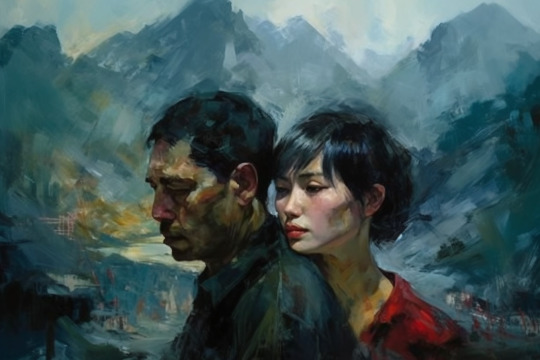
and when white clouds have no master, they just drift off, idle thoughts carefree

Servants too weak to make
arrangements after a long illness
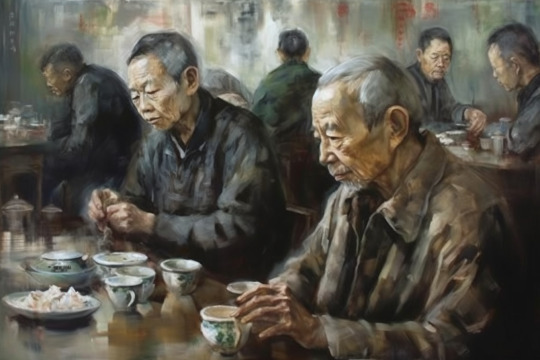
You body lies waiting
Among all those prize books

Hungry mice shredded and
scattered through the house

You’ve gone to the village of new ghosts now
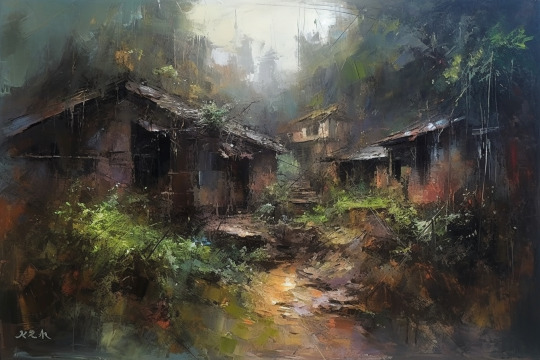
I look into a face a white as jade then watch your burial
ashamed no one follows, clutching at you calling you back
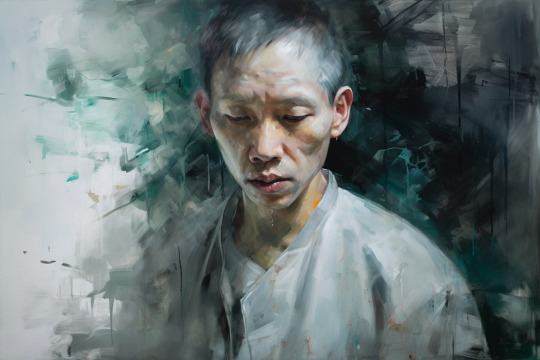
At dusk springs mourn by the hundred,
their empty lament flowing and flowing

Midjourney : Modern Chinese oil painting, <poetry lines>, depth of layers in the style of Shao Wenhuan and Gerhard Richter --ar 3:2 --v 5 --q 2 --s 250
The images were selected on an individual basis rather than maintaining a specific style. The was a conflict in that the style would be constant but the image did not fit or the image was right but the style was different.
This avoids the issue
from:
The New Directions Anthology of Classical Chinese Poetry
Edited by Eliot Weinberger
New Directions Publishing Corporation
New York, NY 10011
2 notes
·
View notes
Text
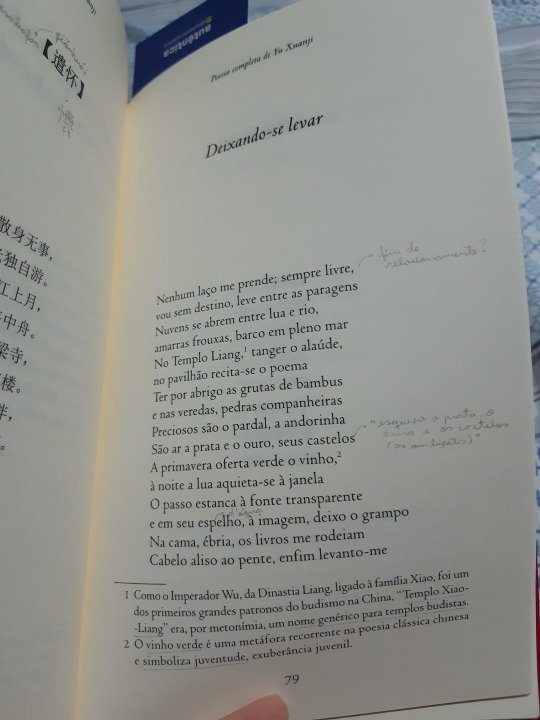

So I bought this book with poetry by poetess Yu Xuanji translated to Brazilian Portuguese and I'm in love with her writing?? She was so cool for a Tang Dynasty lady, her poetry is somehow sometimes relatable to me despite having been written more than a millennium ago
And I absolutely love the work of these translators, they really care about metric, sonority and historical and cultural references, which is something that I find missing when I look up English language translations
#chinese poetry#classical chinese poetry#Yu Xuanji#chinese#brazilian portuguese#translation#poetry#tang dynasty#china
9 notes
·
View notes
Text
theres some research out there abt a poetry generation system... and the poetry it's learning and generating is classical chinese poetry. its a bit old now but here: 10.48550/arXiv.1907.00151
#cant wait to read this later#classical chinese poetry#the researchers say its high quality output which is interesting#mine
0 notes
Photo

Military Smoking: A Brutal Death
Source: k-star-holic.blogspot.com
0 notes
Text
long darkness — cháng yīn 长喑 translation
cháng yīn 长喑 // long darkness
a fan-made song on Xiao Jingyan. I have always been a Mei Changsu over XJY person, but this song from his pov really worked for me and let me see the weightedness of XJY's crown, so I wanted to share it with more.
song link in comment below. (bilibili . com / video / av10441457/)

长剑出鞘冷锋芒 十三载意难忘
缓歌曼舞九重宫 朔风黄沙麾旗扬
手足血脉埋青冢 挚友良弓唯锈藏
岂能折腰屈膝没忠良
the long sword unsheathes from the scabbard, its cool blade revealed. thirteen years, and hard it is to forget.
leisured, soothing melodies with graceful dances at the ninefold palace; north wind and yellow sand with the billowing ensign in the desert. *[1]
brothers-in-arms and brothers in blood in tombs buried, graves long covered in grass; dear friends and cherished bow stored away, now left only to rust —
how is one to bend and kneel, and bury the names of the honourable and the good?
挑灯不眠千军帐 逐千里护家邦
玉壶冰心铁骨铮 扬眉冷看覆风浪
当时少年且横枪 凝尽碧血守四方
守国土河山定国安邦
light a lamp through the unrested nights at the commander’s tent; repel foes a thousand miles, and shield the kingdom.
nobility and aspirations stayed true to, bones of steel resounding. head high, brows lifted, he coolly looks to the tempestuous, overturning storms. *[2]
the youth of the past still danced their spears: blood of the honourable, thoroughly consecrated, defends the four corners of their homeland,
guarding rivers and hills to secure peace of the kingdom’s earth.
(念白:我不要求你能理解,什么是军人铁血,什么是战场狼烟,但有些人,不能伤害,有些事,不能利用。如果连那些血战沙场的将士都不懂得尊重,我萧景琰绝不与你为伍,清楚了吗?)
V/O — I do not expect you to understand a soldier’s honour or the smoke signals on the battlefield. But there are some people you cannot hurt, some things you cannot manipulate. If you cannot even respect the soldiers dying at the battlefront, I, Xiao Jingyan, will never work with you. Do you understand?
铁马金戈谈笑并辔封疆 几回魂梦
凤阙深深夜雨潇潇数闻铃
鸿儒谈笑对面不知相逢 唯知君臣纲
音容早已远谁知苍凉
armoured horses and metal spears, riding in parallel in friendly chatters at the borderlands — how many times has the soul dreamt thus?
depths of the palace, whistling of the nightly rain, a few stray rings of the bells. *[3]
an erudite scholar, now sat opposite in small smiles converse, yet know not to reunite. what leaves is the etiquette of lords and lieges. *[4]
voice and countenance long since distanced — who is to know the desolation and vicissitudes concealed?
谈笑自若朝堂对气轩昂 霁月风光
风云激荡历艰辛终执牙璋
漫漫更鼓朱笔落夜未央 提笔写兴亡
四顾怅惘余音且绕梁
composed in dialogue and pleasantries, assured and imposing at court. he is noble and virtuous as the bright moon and warm breeze.
wading through the unpredictable winds and turmoils, zhang sceptre of jade at last in hand.
drums signifying the night hours sound, red comments from the emperor’s brush move through the boundless night yet to end. a lift of the brush, and prosperities and declines are writ. *[5]
pensive and lost he looks to four sides. remnants of past sounds remain, resonating through the beams of the palace.
(verse 2)
潜龙在渊敛锋芒 风雷动引龙翔
风云际会参参商 瞰天下世道无常
掌中龙渊凛如霜 立丹陛守盛世长
祭酒未凉叹谁人共���
like a submerged dragon in the abyss, he enshrouds his splendour. wind and thunder call his wings to flight. *[6]
in the winds and clouds, he engages in the tumult of the Shen and Shang constellations. from above he looks down at the fickleness of the world.
in his hands, the abyss of the dragon is cold as frost; he stands at the red stairway before the imperial palace, and overlooks an everlasting prosperity.
the wine offering to the dead is yet to cool — I sigh, who is to drink with me?
袖手天下为帝王 垂衣且驭八荒
气宇舒金殿垂拱 揽尽山河只手倾
长歌挽弓射天狼 潜龙一朝御风翔
乾坤日月昭天下清朗
hands folded in sleeves, he gazes at the kingdom before him. as emperor he rules from his attire and directs even the most distant lands. *[7]
with poised air he commands the court, hands held together; the entirety of the kingdom shifts with a tilt of his hand. *[7]
sing high and long; draw your bow to the invading Sirius. the submerged dragon one morn rises to ride the winds. *[8]
heaven and earth, and sun and moon clears, and the world before brightens.
铁马金戈谈笑并辔封疆 几回魂梦
凤阙深深夜雨潇潇数闻铃
鸿儒谈笑对面不知相逢 唯知君臣纲
音容已故徒一身沧桑
armoured horses and metal spears, riding in parallel in friendly chatters at the borderlands — how many times has the soul dreamt thus?
depths of the palace, whistling of the nightly rain, a few stray rings of the bells. *[3]
an erudite scholar, now sat opposite in small smiles converse, yet know not to reunite. what leaves is the etiquette of lords and lieges. *[4]
voice and countenance already bygone, all but a body of desolation remains.
谈笑自若朝堂对气轩昂 霁月风光
风云激荡历艰辛终执牙璋
漫漫更鼓朱笔落夜未央 提笔写兴亡
从此立龙城孤守八方
composed in dialogue and pleasantries, assured and imposing at court. he is noble and virtuous as the bright moon and warm breeze.
having waded through the unpredictable winds and turmoils, zhang sceptre of jade at last in hand.
drums signifying the night hours sound, red comments from the emperor’s brush move through the boundless night yet to end. a lift of the brush, and prosperities and declines are writ. *[5]
from forth he establishes himself in the imperial city of dragons. alone, he awatches the eight corners of his realm. *[9]

Extra notes
for those keen on classical chinese and literature allusions
I’ve cited some allusions and references I was reminded of as I listened to the song. These are subjective, my knowledge of classical texts is very limited, take everything with a grain of salt and please do comment if you’d like to supplement any information.
[1] 缓歌曼舞九重宫 朔风黄沙麾旗扬 — 《长恨歌》 白居易 The Song of Everlasting Regret, by Bai Juyi
缓歌曼舞: from “缓歌慢舞凝丝竹”. This is at the start of the romance tale, where the palace is in carefree bliss and prosperity.
slow and graceful songs / slow dances / slowly the music of the strings and the bamboo reverberate in step with the dances.
朔风黄沙麾旗扬: might be a stretch; I was reminded of “黄埃散漫风萧索”. This is from the same poem as above, we are one fourth in here, and it talks of a war.
yellow dust, scattered, drifts through the air. the bleak wind howls.
[2] 玉壶冰心铁骨铮 — 《芙蓉楼送辛渐》 王昌龄 Bidding Xin Jian farewell at Furong Tower by Wang Changling
玉壶冰心: from “洛阳亲友如相问,一片冰心在玉壶”
if the relatives and friends from Luoyang ask, tell them that my noble intentions are unchanged; a heart of ice in the vase of jade.
[3] 凤阙深深夜雨潇潇数闻铃 — 《长恨歌》 白居易 The Song of Everlasting Regret, by Bai Juyi
夜雨潇潇数闻铃: again could be a stretch; I was reminded of “夜雨闻铃肠断声” from the same poem as [1]. (don’t ask me why, this entire song is infused with this piece it feels). This talks of the same romance tale, in which the emperor mourns the death of his beloved.
in the nightly rain, the sound of the bells could be heard. it sounds as sorrowful and agonising as the breaking of intestines.
[4] 鸿儒谈笑对面不知相逢 唯知君臣纲 — 《陋室铭》 刘禹锡 An Inscription of the Humble Abode by Liu Yuxi; 《江城子》 苏轼 Jiang Cheng Zi, by Su Shi
鸿儒谈笑: from "谈笑有鸿儒,往来无白丁" credits to @fwoopersongs because my brain happily omitted it!
well-learnt scholars congregate in joyous talk, traversing there is no uncouth and unread.
不知相逢: there are many poems on this topic, one of the most notable ones would be “纵使相逢应不识,尘满面,鬓如霜。”
even if we met (Su Shi and his deceased wife), you should not be able to recognise me. dust covers my face, and the hair of my temples is white as frost.
[5] 漫漫更鼓朱笔落夜未央 — 《长恨歌》 白居易 The Song of Everlasting Regret, by Bai Juyi (added in edit)
漫漫更鼓: Okay, "迟迟钟鼓初长夜" immediately came to mind when I saw this phrase, but I went like here's too many footnotes already and thought it was too much of a stretch to put in (there's only one word in common!). Then I looked into the original poem, in which the timely bi-hour rings of the drum felt lengthened because of the emperor's agony over losing his loved one -- and so I went like, okay, this is relevant, I actually need to add this in.
the drums reporting the hour of the night come late, and it is early in the long night.
漫漫 meaning endless, without an end in sight. This echoes the sentiments of the emperor in Bai Juyi's poem in feeling that the night is everlasting and without end.
[6] 潜龙在渊敛锋芒 — 《易经》 Yi Jing, the Book of Changes
潜龙: There’s an awful lot of “submerged dragon” metaphors in this stanza. Technically it's a figurative "talents hidden dragon" rather than literally, under the waters. This is from Yi Jing essentially, a super old book on divination that does have some wisdom of old sayings in it. The submerged dragon talks of how the dragon, currently veiled, is a powerful being simply not revealed to worldly eyes yet, and is waiting for opportunity to strike (more like, soar, in this context). These lyrics parallel Xiao Jingyan with the allusion to talk about how he stayed silent for thirteen years before his time of brilliance.
[7] 袖手天下为帝王 垂衣且驭八荒 / 气宇舒金殿垂拱 揽尽山河只手倾 — Taoism concept
Okie this is super complicated and involves a Taoism context, some history from the beginning emperors of the Han dynasty, and a very enthusiastic Emperor Taizong of Tang; I don’t really know how to go about this.
袖手, 垂衣驭八荒, 垂拱, these all lead to the same concept, and the middle chunk in particular is from a poem written by Emperor Taizong of Tang. Theory suggested by Laozi and Zhuangzi of Taoism, overall it talks of inaction, which is action the emperors at the start of the Han dynasty employed. They demanded less of their citizens and let the economy recover naturally (agriculture and such), and since these policies worked, the starting few Han emperors were regarded highly with this kind of purposeful and benevolent “inaction”.
In short, this song here uses these descriptions to talk of Jingyan as a competent and masterful leader.
[8] 长歌挽弓射天狼 — 《江城子·密州出猎》 苏轼 Hunting outside Mizhou (yet another Jiang Cheng Zi), by Su Shi
挽弓射天狼: from “会挽雕弓如满月,西北望,射天狼。”
I shall draw my carved bow like the full-moon, point towards the northwest, and shoot in the direction of the intruders.
天狼 means Sirius star. In chinese astronomy/astrology it was somewhat related to evilness, hence the use of Sirius to denote intruders.
[9] 从此立龙城孤守八方
I just added this this is not a reference it just really reminds me of this fanfiction oneshot 此生一诺 (this life, a pledge)! It talks about XJY at the end of everything, he draws a circle about the ground and entraps himself with the promise he made to see the world a better place under his reign (from the chinese idiom 画地为牢). I recced the oneshot here if you wish to check it out.

arghhh the entire course of me writing the tl was me going oh goodness why is there yet another footnote but I’m glad to be done for now.
Like, goodness. There is not one “he” or “him” reference in the lyrics. I would love to do the same, but you can see me getting more and more resigned towards the end of the translation.
I am sooo inclined to passive voice and invert subjects for every sentence when it comes to translations, I realise, and I apologise for the almost-signature abundance of semicolons and em dashes in the translation (I blame it on the difference in punctuation nuances. — I subconsciously use semicolons for semi-parallel sentence structures, so you can spot out imperfect couplets that way.) Massive respect to all those who translate, because easy is it to hatch out a crude translation in five minutes, it is not treading about the delicate balance between literal and metaphorical, and in all honesty I feel that it is just way easier for me to write literal once, then go off the rails and do super-figurative for the other.
There are far more annotations and word definitions I’d like to add (I could literally do a classical text/poetry meta for every word lmao), but evidently, time constraints, and truthfully it would take forever to complete, so on a “ask me and I’ll try to elaborate” basis again.
The V/O — I’d love to make it more archaic, but the dialogue from the drama in this part was so modern apologies I’m sort of disappointed with the translation over here.
Re: song title. Yes, it sounds a little weird, excuse that.
I considered other translations for the song title, but none of them really gave the impression I really wanted. Words like “eternal” and “everlasting” were too permanent, I wanted to express the idea of the darkness being lengthened, yet with Jingyan’s reign it would come to an end, hence my hesitance. “Continual” is one I fiddled with: it did not give the same curt, direct feeling as “long” however, so in the end I just ended up with the simplest title.
#nirvana in fire#琅琊榜#nif#lyb#lang ya bang#xiao jingyan#chinese translation#chinese language#cdrama#chinese#literary chinese#classical chinese poetry#fate translates#fate creates
40 notes
·
View notes
Text

" In your smile, I see something more beautiful than the stars."
#light academia#poetry#dark academia#love quotes#classic literature#literature#poetry stuff#bookblr#readers#romantic quotes#romantic academia#master devil do not kiss me#cdrama#cdrama quotes#chinese drama
11 notes
·
View notes
Text
On the way to breakfast today a random old guy wearing a bandana looked at me and loudly recited a line of Tang Dynasty poetry. I knew it was poetry because of his cadence, which also meant I was not going to be able to figure out the characters on my own, so I asked the brekkie shop boss lady if I could ask her a question only Taiwanese people would know. She was like 'oh! That's 明月松間照 by 王維! No, I don't know why he'd say that either.'
#if i see him again i could finish the line,which is 清泉石上流#although chances are he wouldn't remember the incident at all#there is some controversy as to how much classical Chinese should be taught in taiwanese public school#but in this case it's remarkably useful that tang poetry is common knowledge#good because i misheard zhào as sào or cào so i couldn't look it up by pinyin#i had to literally repeat it to someone before i forgot
16 notes
·
View notes
Text
happy delayed gushiwensday, here's master Su Dongpo at his loudest and brashest. truly haofang in style
A Hunt in Mizhou
to the tune "River Town"
Su Shi (Su Dongpo)
Make an old man young again for now, headstrong,
With a yellow hound leashed
And a goshawk too,
Brocade hat and a sable coat on
As a thousand riders make the flat hilltop tall.
The whole city's turned out; like a good governor I'll
Shoot a tiger myself
Like a second Sun Quan.
Intoxicated, with chest inflated and courage too
See these grays coming in
Is that a crime?
Ride out with a pardon to Yunzhong,
Feng Tang, ride out soon.
My painted bow's ready to bend round like the moon,
Sight northwest
And shoot the wolf down.
--
江城子·密州出猎
苏轼
老夫聊发少年狂,左牵黄,右擎苍,锦帽貂裘,千骑卷平冈。为报倾城随太守,亲射虎,看孙郎。
酒酣胸胆尚开张。鬓微霜,又何妨!持节云中,何日遣冯唐?会挽雕弓如满月,西北望,射天狼。
Yunzhong: modern-day Togtoh county, Hohhot, Inner Mongolia
shoot the wolf down: the Heavenly Wolf Star, Sirius (lol), symbolized invasion and strife. in the context of Su Shi writing in the Northern Song dynasty, this would be Western Xia in the northwest (it didn't go well for the Song, as Li Qingzhao's satirical poetry will attest).
i'm too tired to write extensive notes for this one but you can find more of them on this bilingual post from Stanford's Global Medieval Sourcebook, my new fav resource for ci poems. Or just search the web, this is a pretty famous one of his and there's multiple English translations out there.
i think my translation is a fun one to read aloud, though. it's probably the closest i've gotten to a rhyming translation with this project (as the original is strongly rhymed too with all those -ang lines). it helped that i bounced it between scratch paper on tues night, to a notepad file, to an entirely new draft today on my laptop after some more research on my phone.
13 notes
·
View notes
Text
[Episode transcript here.]
苏轼 Su Shi (Su Dongpo)
江城子·乙卯正月二十日夜记梦 Dream, 20/1/1075
十年生死两茫茫,
不思量,自难忘。
千里孤坟,
无处话凄凉。
纵使相逢应不识,
尘满面,鬓如霜。
夜来幽梦忽还乡,
小轩窗,正梳妆。
相顾无言,
惟有泪千行。
料得年年肠断处,
明月夜,短松冈。
ten years -- the haze of distance between the living and the dead
one doesn't think on it much
one never forgets it
a thousand miles of lonely graves
nowhere for my living voice to speak misery
even if we meet again, you would hardly know me
a face full of dust
white in my hair
with a strange dream at night i am suddenly back home
that little window
where you are getting ready
we look at each other, but words don't come
only a thousand lines of tears
i will be waiting every year at the place of my heartbreak
the bright moon at night
a mound of short pines
Further reading:
#gushiwensday translation by garden-ghoul
Notes by Nina Du, Runqi Zhang, and Dante Zhu; translation by Quan Jia (Global Medieval Sourcebook)
9 notes
·
View notes
Text
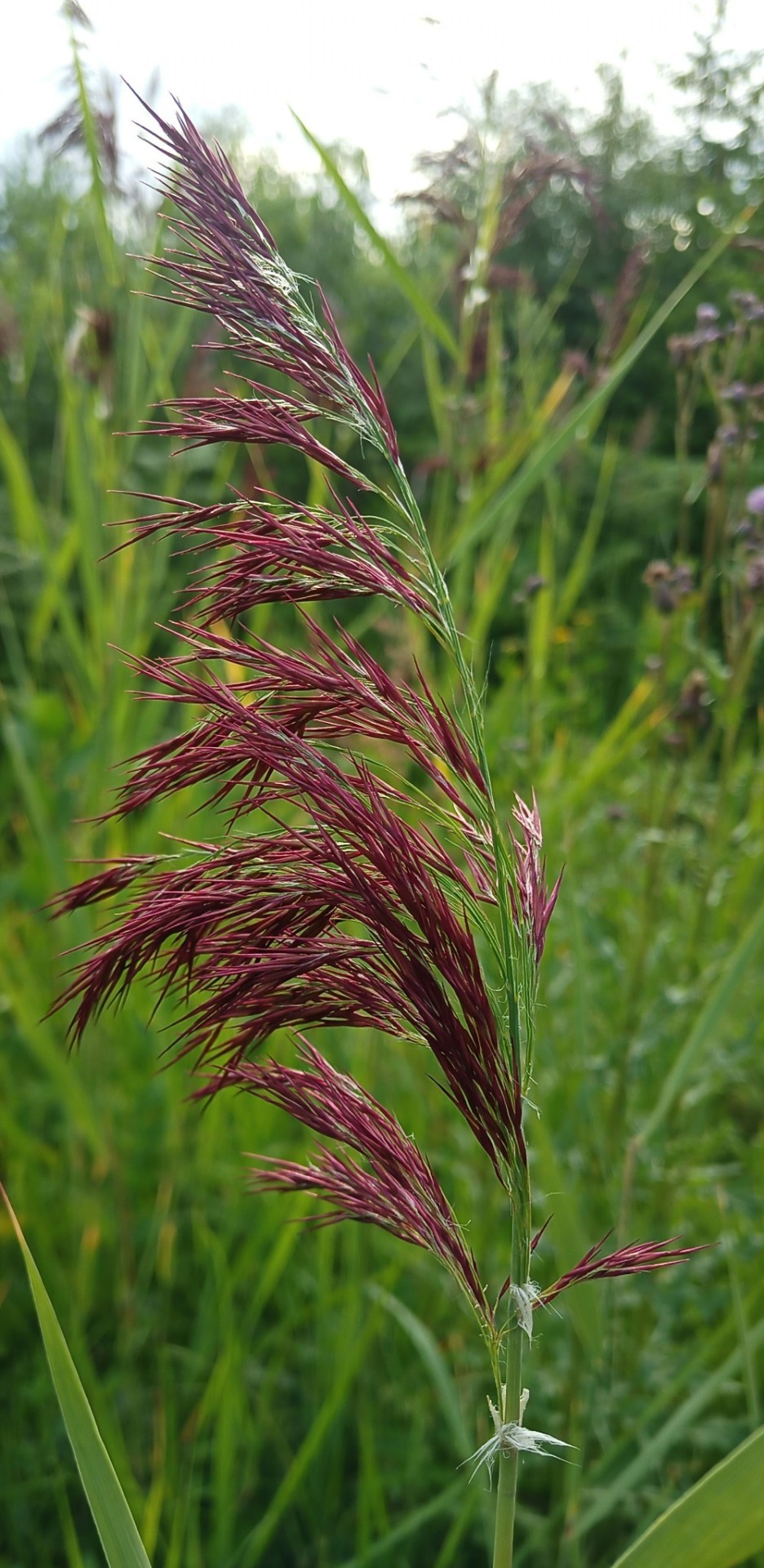
Photo : ©skondal
蘆葦 / Phragmites australis (COMMOM REED) 💞 the feeling the color~*
它生長在沼澤、湖泊或溪流、溝渠邊,喜歡潮濕向陽的環境,常成群繁生。
▪︎食用:1. 根部洗淨後可啃食,略帶甜味。2. 嫩筍可切段炒肉絲。煮熟後拌沙拉食用,更可煮湯等。嫩葉可作牛羊馬的飼料。 3. 果實去殼後取米,可煮飯或者粥。
▪︎稈可建築茅屋,或代軟木作絕緣材料;其外層稈壁可織簾、席;纖維造紙。
▪︎花序作掃帚。
▪︎根入藥,為健胃和利尿藥;
▪︎是優良固堤植物。
▪︎藥用:性味~ 蘆根、蘆筍(嫩苗):甘、寒。
▪︎效用:蘆根:清熱生津,滲濕利水,除煩止嘔。治胃熱嘔噦,熱病煩咳,肺熱咳嗽,熱淋澀痛;
筍:止渴利尿。治熱病口渴,淋病小病不利;
蘆莖:治肺癰煩熱;
蘆葉:治上吐下瀉,鼻衄,肺癰,發背;
籜葉:治金瘡;
蘆花:止血解毒。
═════════ ✾ ═════════
這比喻的意思是種子是天主的話。
那些在路旁的,是指那些人聽了,隨後就有魔鬼來到,從他們心中把那話奪去,使他們不至信從而得救。
那些在石頭上的,是指那些人,他們聽的時候,高興地接受那話,但這些人沒有根,暫時相信,一到試探的時候,就退避了。
那落在荊棘中的,是指那些聽了的人,還在中途就被掛慮、錢財及生活的逸樂所蒙蔽,沒有結出成熟的果實。
那在好地裏的,是指那些以善良和誠實的心傾聽的人,他們把這話保存起來,以堅忍結出果實。
Now the parable is this: The seed is the word of God.
And they by the way side are they that hear; then the devil cometh, and taketh the word out of their heart, lest believing they should be saved.
Now they upon the rock, are they who when they hear, receive the word with joy: and these have no roots; for they believe for a while, and in time of temptation, they fall away.
And that which fell among thorns, are they who have heard, and going their way, are choked with the cares and riches and pleasures of this life, and yield no fruit.
But that on the good ground, are they who in a good and perfect heart, hearing the word, keep it, and bring forth fruit in patience.
─ 路加福音Luke : Chapter 8 : 11~15
Thank you 🙏 Amen~*
═════════ ✾ ═════════
And I love this beautiful poetry very much ..... my dad taught us since we're kids :'(
詩經 Classic of Poetry -《秦風.蒹葭》(蒹葭 : commom reed /Phragmites australis)
蒹葭蒼蒼,白露為霜。 所謂伊人,在水一方。
溯洄從之,道阻且長。溯游從之,宛在水中央。
蒹葭萋萋,白露未晞。所謂伊人,在水之湄。
遡洄從之,道阻且躋。遡游從之,宛在水中坻。
蒹葭采采,白露未已。所謂伊人,在水之涘。
遡洄從之,道阻且右。遡游從之,宛在水中沚。
youtube
#skondal#reeds#life#蘆葦#commom reed#well known chinese poetry:蒹葭 by 秦風#詩經 classic of poetry#song : 在水一方#鄧麗君 teresa teng#the feeling the color#💗
13 notes
·
View notes